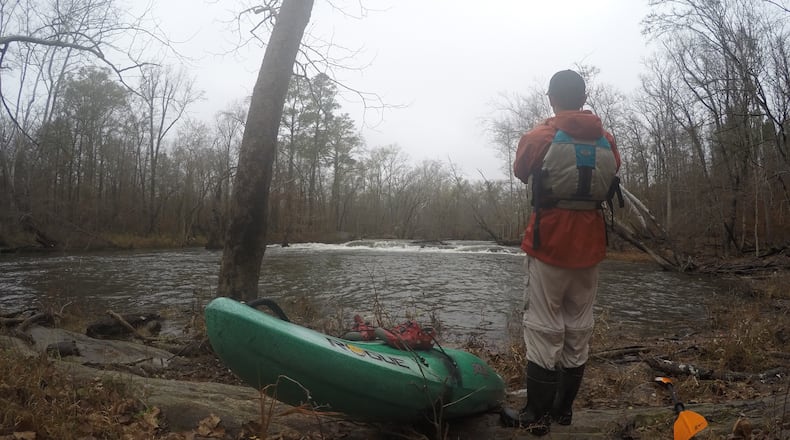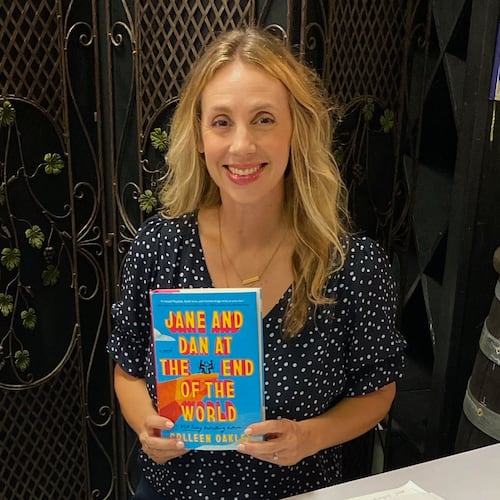It’s a sunny morning in mid-September when Gordon Johnston, a Mercer University professor of creative writing and literature, sits down for a cup of coffee at the popular Z-beans coffee shop in historic downtown Macon to talk about his new book, “Seven Islands of the Ocmulgee: River Stories” (Mercer University Press, $20).
In seven loosely related stories set on the Ocmulgee River from the 1810s to the present, Johnston’s characters carry a whiff of Flannery O’Connor’s unforgettable and mystic misfits. A dying man suddenly shows up at church and wants a river baptism; an aimless teenager immerses himself in secondhand Muscogee traditions and ensnares a grocery store manager in his amateur rituals; a prostitute moonlights as a nude model for art classes at the university. For each character, the river is a setting and has unique meaning, whether for cleansing, escape, discovery, power or peace.
Johnston is a slim, boyish, cheerful 56-year-old who brings his own burnished brown mug to the coffee shop. It was fashioned by middle Georgia ceramicist Roger Jamison, an old friend.
“I don’t like trash,” Johnston explains.
But there might be something more to it than that.
Each spring, Johnston joins a crew of potters to assist Jamison in stoking a wood-kiln filled with pottery, to which Johnston contributes “clay pages” inscribed by hand with his poems. With the mug he carries art, friendship, riparian Georgia clay — even the river itself. That’s emblematic of this man for whom interlocking connections with people, nature, the arts and God run deep.
Johnston grew up in Warner Robins and Dearing where he spent time fishing with his Dad on the Flint, Savannah and Chattooga rivers. He joined Mercer University’s faculty in 1996. His wife, Pamela, is a United Methodist minister, and they have a daughter, Emma, and two sons, Micah and Graham. This is Johnston’s first short story collection, although he has published two volumes of poetry — “Scaring the Bears” and the newly released “Where Here is Hard to Say.” He’s also coauthor of a hybrid nonfiction history of the Ocmulgee National Monument co-written with Matthew Jennings that is layered with Johnston’s field notes and poems, penned while he was writer-in-residence at the monument from 2012-2014.
Credit: John Legg
Credit: John Legg
While in college Johnston took a whitewater canoeing class, and he has been canoeing and kayaking ever since. In 2008, he paddled from Pope’s Ferry to Macon on the Ocmulgee River, a trip that inspired him to float the entire 255-mile river over the course of four years and a dozen trips, accompanied by a regular crew of paddling partners.
The journey took him from just below Jackson Lake southeast of Atlanta, over the shoals of the Seven Islands, past the coal-fired stacks of Plant Scherer in Juliette, through the sylvan quiet of Macon’s Amerson River Park and Ocmulgee Mounds National Historical Park, and down to the Forks below Lumber City, where the Ocmulgee and Oconee merge into the Altamaha.
For 17,000 years there have been people living along the Ocmulgee. “I was drawn to that long human history along the river,” he says. “I wanted to know about the other lives lived there, lives so different than mine. And there are these mystical moments that happen along the river. It’s a different river every time you’re on it. Above the fall line, near Lake Jackson, it’s like a mountain run — quick and rocky, beavers popping out of holes in the banks. Down by Bond Swamp, you see more snakes. Below Hawkinsville, you can pitch a tent on sandbars and sleep; that’s where you start seeing ‘gators every other bend. I was enthralled.”
He also got to know what he calls the Ocmulgee’s subtle sense of humor. “There was that time finishing a placid section at Bullard, someone commented how the paddle had been too easy, then the lead canoe flipped at the take-out.” He chuckles, still mystified years later. “No rapid, no snag. It was inexplicable. We all just laughed.”
As he repeat-paddled certain sections and reread the river’s topography, Johnston found that characters came to him.
“My eye lingered on a particular rock at the end of an island above a rapid. I saw a kid standing there, seemingly stranded. And I wondered, who is he and what is he doing in that risky place? Other times I would see some unexplainable thing — a shopping cart pitched into the water and weighted down with rocks … it was like a Buddhist koan. Who did that? Why?”
To find out, Johnston let the characters talk.
Credit: Mercer University Press
Credit: Mercer University Press
In “The Only Place to Start From,” the man responsible for retrieving the mysterious shopping cart came to him as a grocery store manager named Peavey: “I felt his frustration, lack of patience and utter divorce from the natural world,” says Johnston. Grabbing a pair of “ridiculously high and heavy” black rubber boots, Peavey tries to rescue the cart and return it to the store, but he soon encounters the savage power of the river that knocks him over and floods his boots. “(T)he river whacked him back with October cold that simultaneously burned his outsides and squeezed his insides.”
Inside the cart is a huge, mythic, terrifying fish with “an undead eye” … “predatory and prehistoric … the last of its kind.” The person who put it there is a teen named John Mark, who peers at Peavey from the bridge and warns him to stop: He ain’t your fish. The boy “hungers for a long history” and reads about the indigenous ways — stealing books from the Ocmulgee Mounds National Historic Park’s visitor center, but later returning them. Wanting to help him, Peavey is drawn into the boy’s world and borrowed rituals. They are strange bedfellows, but in the end both gain from the encounter.
In another powerful story, “Burying Ground,” a dying man seeks a river baptism. The story begins with an irresistible hook: “The Wednesday after his stroke, Nicodemus came to church for the first time in thirty years.”
Demus eventually gets his river baptism, donning a white robe that swells in the breeze until he looks like “a great, white-bundled baby … a sail. A bride.” But the story takes a turn when a furious, grieving pickup truck driver shows up wanting to kill or be killed.
“First I wrote poems about the rivers and creeks I paddled,” Johnston says, “but poems are about moments. The Ocmulgee and Altamaha are long, sustained flows with an enormous volume of water coursing through them. I felt I was being carried from one river setting to another, from one scene to another. The experience demanded the dense language of prose, so I returned to the short story. It felt like the right form.”
For Johnston, the river is mystic force that remakes those who traverse it. “Always he comes wanting to meet the river and paddle it — but in person her volume and authority take him aback,” he writes in the final story, “Going to Water on Wise Creek.” “She is legion, reckless, a downhill riot … the best and worst moment in a wild place is the recognition of what one has to lose.”
There is this one bend, says Johnston, where a sycamore tree has gone down and only one branch pokes up above the water. “It has lived that way for eight years. That one branch is thriving. Most of the root ball is in the air, too. I delight in that. I love paddling around that bend. In the midst of death there’s still life.”
Credit: Don Ream
Credit: Don Ream
His new book of poems, “Where Here Is Hard to Say,” also draws inspiration from the river. The title refers to how a kayaker is never entirely still on the current, never able to say precisely where he is. It also speaks to the grief, physical changes and other transitions a soul encounters in middle age — arrivals it’s hard to admit you have come to.
Johnston continues to paddle as often as he can. Since finishing the Ocmulgee, he has paddled all of the Oconee, Altamaha and Flint rivers, and is within 50 miles of finishing the Suwannee in Florida
Ultimately, says Gordon, the gift of paddling a river is that “everything melts away and you are just there, dealing with whatever the river doles out to you. You’re always in motion,” he said. “Soon you begin to think of even your life on land as a river, a current on which you move. We can negotiate the speed at which we’re going but can never truly stop. Even at rest, we are being carried on.”
About the Author
Keep Reading
The Latest
Featured





